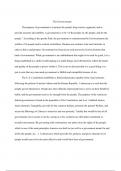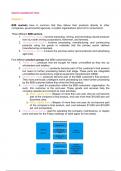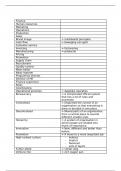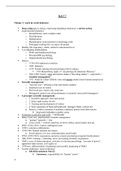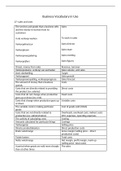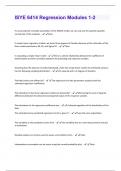Research Methods and Study
Design
Gray Summary
,Chapter 1 Introduction
Research in the real world
A researcher should pay equal attention to each of the phases.
What is a theory?
A set of interrelated concepts, definitions, and propositions that present a
systematic view of phenomena by specifying relations among variables,
with the purpose of explain and predicting phenomena.
A theory is an accumulated body of knowledge, written by
acknowledged experts.
A theory informs ‘state of art’ concepts and innovations
A theory is a body of work were inconsequential or misleading ideas
can be filtered out
A theory represents knowledge that should be viewed critically and
rejected when incompatible with practice.
A theory adds interest and intellectual stimulation to a project.
A theory acts as a model against which ‘live’ business processes can
be evaluated.
A theory guides the execution of research methodology.
Overview of research process
,A RQ provides an essential bridge between the literature review (the
subject) and the methodology (how the subject is going to be investigated
and researched).
, Chapter 2 Theoretical perspectives and research
methodology
Inductive and deductive reasoning
A deductive approaches moves towards hypothesis testing. Stages in the
deductive process: organizational mission, theory, hypothesis,
operationalize, testing by corroboration or attempted falsification,
examine outcomes, modify theory if necessary.
Through the inductive approach, plans are made for data collection, after
which the data are analysed to see if any patterns emerge that suggest
relationships between variables. The inductive approach does not set out
to corroborate or falsify a theory. Instead, through a process of gathering
data, it attempts to establish patterns, consistencies and meaning.
inducive and deductive processes, however, are not mutually exclusive.
Epistemological and ontological perspectives
Epistemology is the theory of knowledge, especially with regard to its
methods, validity, and scope, and the distinction between justified belief
and opinion. While ontology embodies understanding what is epistemology
tires to understand what it means to know and provides a philosophical
background for deciding what kinds of knowledge are legitimate and
adequate. It holds at least three positions:
Objectivism: holds that reality exists independently of
consciousness, there is an objective truth out there. Researchers
should strive not to include their own feelings and values.
Constructivism: rejects this view of human knowledge. Truth and
meaning are created by the subjects interactions with the world.
Subjects construct their own meaning in different ways, even in
relation to the same phenomenon. Multiple, contradictory but
equally account of the world exist.
Design
Gray Summary
,Chapter 1 Introduction
Research in the real world
A researcher should pay equal attention to each of the phases.
What is a theory?
A set of interrelated concepts, definitions, and propositions that present a
systematic view of phenomena by specifying relations among variables,
with the purpose of explain and predicting phenomena.
A theory is an accumulated body of knowledge, written by
acknowledged experts.
A theory informs ‘state of art’ concepts and innovations
A theory is a body of work were inconsequential or misleading ideas
can be filtered out
A theory represents knowledge that should be viewed critically and
rejected when incompatible with practice.
A theory adds interest and intellectual stimulation to a project.
A theory acts as a model against which ‘live’ business processes can
be evaluated.
A theory guides the execution of research methodology.
Overview of research process
,A RQ provides an essential bridge between the literature review (the
subject) and the methodology (how the subject is going to be investigated
and researched).
, Chapter 2 Theoretical perspectives and research
methodology
Inductive and deductive reasoning
A deductive approaches moves towards hypothesis testing. Stages in the
deductive process: organizational mission, theory, hypothesis,
operationalize, testing by corroboration or attempted falsification,
examine outcomes, modify theory if necessary.
Through the inductive approach, plans are made for data collection, after
which the data are analysed to see if any patterns emerge that suggest
relationships between variables. The inductive approach does not set out
to corroborate or falsify a theory. Instead, through a process of gathering
data, it attempts to establish patterns, consistencies and meaning.
inducive and deductive processes, however, are not mutually exclusive.
Epistemological and ontological perspectives
Epistemology is the theory of knowledge, especially with regard to its
methods, validity, and scope, and the distinction between justified belief
and opinion. While ontology embodies understanding what is epistemology
tires to understand what it means to know and provides a philosophical
background for deciding what kinds of knowledge are legitimate and
adequate. It holds at least three positions:
Objectivism: holds that reality exists independently of
consciousness, there is an objective truth out there. Researchers
should strive not to include their own feelings and values.
Constructivism: rejects this view of human knowledge. Truth and
meaning are created by the subjects interactions with the world.
Subjects construct their own meaning in different ways, even in
relation to the same phenomenon. Multiple, contradictory but
equally account of the world exist.

